With an ROI of 1400%, affiliate marketing is one of the top marketing strategies worldwide. It is no longer just a trend but has become a crucial marketing segment.
Over 8 in 10 brands worldwide leverage affiliate marketing, and over one-third of the businesses successfully use their affiliate programs.
Let’s explore more about the affiliate marketing industry, its applications in business, usage, the salary of affiliate marketers, and more in this post.
Top Affiliate Marketing Statistics 2025
- The global affiliate marketing industry is valued at over $17 billion.
- The affiliate marketing software market worldwide is predicted to grow at a CAGR of 17.7% from 2023 to 2033 and reach $7.72 billion.
- Affiliate marketing accounts for 15% of the digital media industry’s revenue.
- 81% of brands have affiliate marketing programs.
- Affiliate marketing has an average return of $15 for every $1 invested.
- 31% of the web publishers stated that affiliate marketing is their top revenue source.
- 75.8% of affiliate marketers use Facebook for affiliate marketing.
- The top three most profitable affiliate market niches are Education/E-Learning, Travel, and Beauty/Skincare.
- Affiliate marketers make an average of $87,605 per year.
Affiliate Marketing Industry Statistics
The global affiliate marketing industry is valued at over $17 billion.
Comparatively, in 2016, the affiliate marketing industry worldwide was valued at $12 billion. That displays an increase of $4 million or 30.77% since 2016.
The affiliate marketing market in the United States is alone valued at over 6 billion.
Source: Optin Monster
The affiliate marketing software market worldwide is predicted to grow at a CAGR of 17.7% between 2023 and 2033.
The worldwide affiliate marketing software market size was $1.50 billion in 2023 and is forecasted to reach $7.72 billion in 2033.
Besides, the global affiliate market grew at a CAGR of 15.6% between 2018 to 2022.
The United States is expected to maintain its position as the global leader in the affiliate marketing software market. By 2033, the country is predicted to account for $1.1 billion in the market.
Further, the affiliate marketing software market in the United States is forecasted to grow at a CAGR of 9.4% between 2023 and 2033.
Source: Future Market Insights
Affiliate marketing spending in the United States was estimated at $8.2 billion in 2022.
The affiliate marketing spending in the country is estimated to have grown by $4 billion between 2015 and 2022.
Here is a table displaying the affiliate market spending recorded in the United States over the years.
| Year | Affiliate Marketing Spending in the United States |
|---|---|
| 2022* | $8.2 billion |
| 2021* | $7.4 billion |
| 2020* | $6.8 billion |
| 2019* | $6.4 billion |
| 2018* | $5.9 billion |
| 2017 | $5.4 billion |
| 2016 | $4.8 billion |
| 2015 | $4.2 billion |
| 2014 | $3.4 billion |
| 2013 | $2.9 billion |
| 2012 | $2.5 billion |
*- Estimated values
Source: Statista
Affiliate marketing accounts for 15% of the digital media industry’s revenue.
It is accountable for 16% of the eCommerce sales in the United States and Canada.
Affiliate marketing is a key component of online marketing and is as effective as other digital marketing strategies. Plus, it is one of the major sources of eCommerce orders and surpasses the share of sales made through display advertising and social commerce.
Source: Business Insider
Affiliate Marketing And Businesses
81% of brands have affiliate marketing programs.
Affiliate marketing helps the business reach a large share of the target audience and increases sales. Businesses can also drive quality leads without investing much or hiring a marketing company.
Source: Optin Monster
33% of US marketing directors believe that affiliate marketing programs are extremely successful.
Overall, 42% of the directors in the United States stated that their affiliate marketing programs are successful.
Only 5% of the country’s marketing directors said their affiliate programs were unsuccessful.
The following table displays the success rate of affiliate marketing programs recorded in the United States.
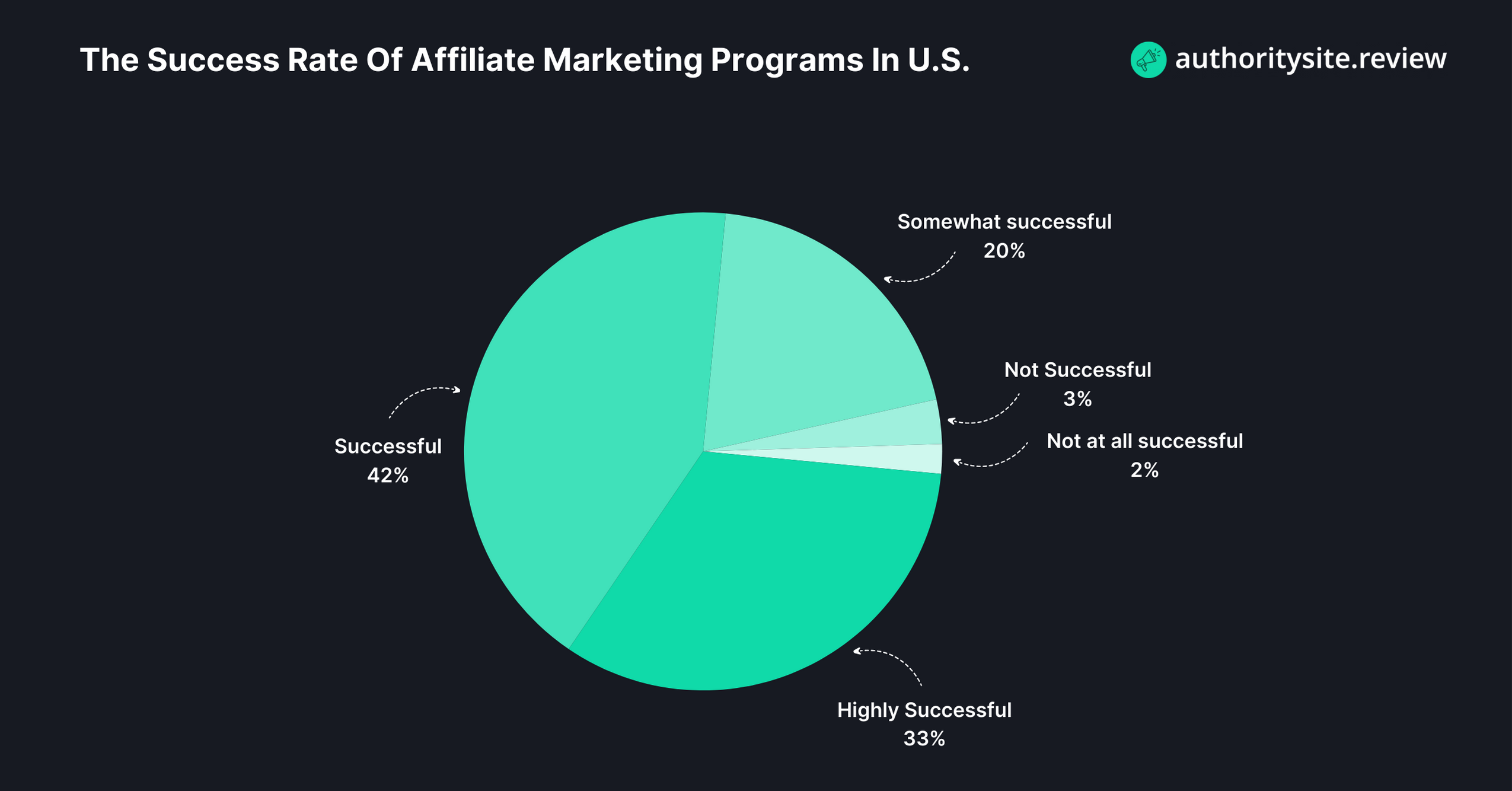
| Success Rate | Percentage of Marketers |
|---|---|
| Highly Successful | 33% |
| Successful | 42% |
| Somewhat successful | 20% |
| Not Successful | 3% |
| Not at all successful | 2% |
Source: Pepperjam
31% of the web publishers stated that affiliate marketing is their top revenue source.
82% of the websites make over 6 figures annually through monetization with the help of affiliate products and display ads. Affiliate marketers stated that affiliate marketing brings in more revenue than ad monetization.
The average affiliate website RPM is $149.76.
Source: Authority Hacker
27.8% of businesses and brands prefer blogging to market their affiliate products.
After social media, blogging is the most preferred method for marketing affiliate products.
Besides, 18.7% of marketers prefer review sites to market their affiliate products, and 14.8% prefer coupon sites.
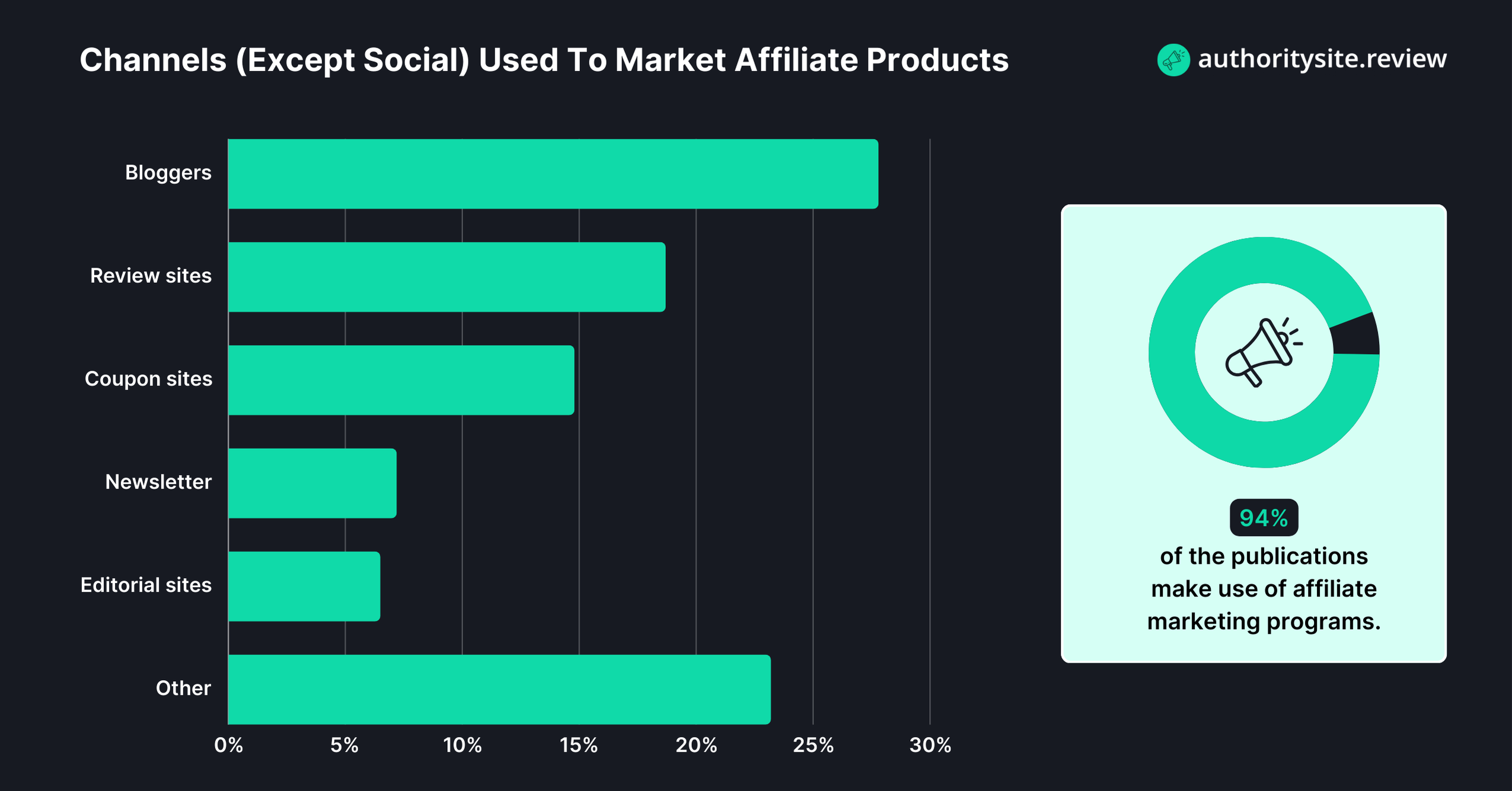
Here is a table displaying the share of brands and businesses that use different channels to market their affiliate products.
| Channel for Affiliate Marketing | Share of Brands |
|---|---|
| Bloggers | 27.8% |
| Review sites | 18.7% |
| Coupon sites | 14.8% |
| Newsletter | 7.2% |
| Editorial sites | 6.5% |
| Other | 23.2% |
94% of the publications make use of affiliate marketing programs.
The majority of the publishers are involved in two or more affiliate programs.
Besides, according to 50% of marketers, affiliate marketing is an effective technique for achieving goals.
On average, the affiliate commission a brand can earn is said to be between 5% and 30%.
Source: Authority Hacker, Affiliate WP.
Affiliate Marketer Statistics
75.8% of affiliate marketers use Facebook for affiliate marketing.
Facebook is the most preferred social media platform by affiliate marketers to promote a product or a brand.
Instagram is the second most preferred social media platform for affiliate marketing, with 61.4% of affiliate marketers using it.
Only 19% of affiliate marketers use LinkedIn for affiliate marketing, while 36.9% use YouTube videos.
The following table displays the social media platforms most used by affiliate marketers for affiliate marketing.
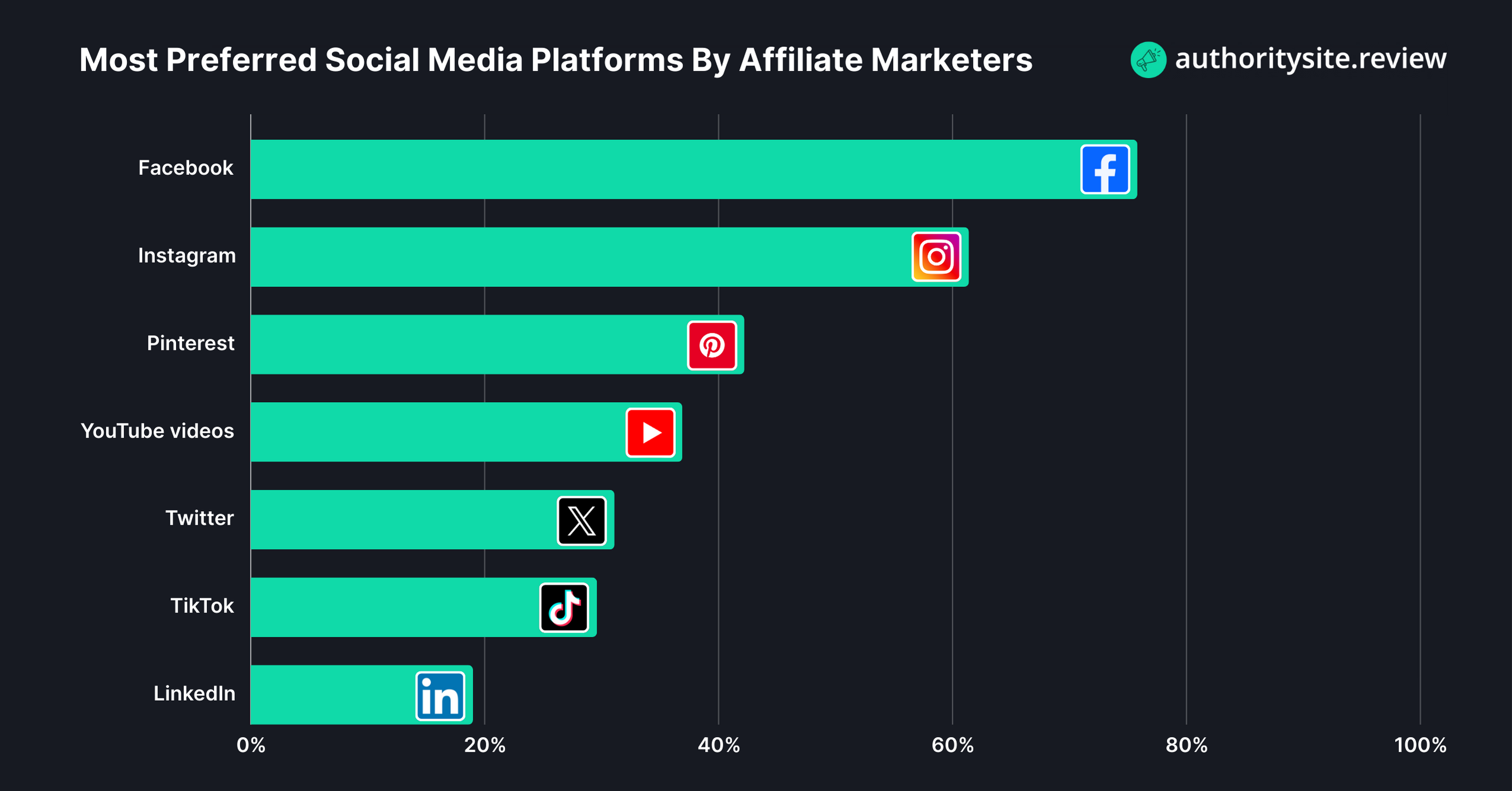
| Social Media Platform | Percentage of Affiliate Marketers |
|---|---|
| 75.8% | |
| 61.4% | |
| 42.2% | |
| YouTube videos | 36.9% |
| 31.1% | |
| TikTok | 29.6% |
| 19% |
Source: Authority hacker
Nearly 55% of affiliate marketers work from home.
Besides, 26% of the affiliate marketers said that they worked at both an office place and from home.
Less than 20% of the affiliate marketers commuted every day to an office space.
Source: Luisa Zhou
Demographics Of Affiliate Marketers
54% of the affiliate marketers are male.
In comparison, 43% of the affiliate marketers are female.
This shows that a large share of men are more likely to make their careers in affiliate marketing than women.
However, over three-fourths of affiliate marketing managers are female.
Source: Authority hacker
Nearly one-third of the affiliate marketers are aged 35 to 44.
Another third of affiliate marketers are aged between 18 and 34. Of these, 25.55% are aged 25 to 34.
Only 11.42% of the affiliate marketers are aged over 55 years.
The following table displays the distribution of affiliate marketers by age.
| Age Group | Share of Affiliate Marketers |
|---|---|
| Under 18 years | 0.29% |
| 18 to 24 | 5.08% |
| 25 to 34 | 27.55% |
| 35 to 44 | 31.86% |
| 45 to 54 | 22.41% |
| 55 to 64 | 8.67% |
| 65 or above | 2.75% |
| Prefer not to answer | 1.39% |
Source: Statista
Trend-based products are selected 47.16% more than products based on commission or personal experience.
However, 35.1% of affiliate marketers choose products based on personal interests, while 25.1% choose products based on commission rates.
Source: Authority Hacker
Over half of the affiliate marketers worldwide are in the United States.
The United States is home to 57% of the affiliate marketers worldwide.
Meanwhile, 10% of the affiliate marketers are from Canada, and 2% are from India.
Source: Authority Hacker
Affiliate Marketing Statistics By Niche
The top three most profitable affiliate market niches are Education/E-Learning, Travel, and Beauty/Skincare.
The average income of affiliate marketers in the education and e-learning niches is $15,551.
Meanwhile, affiliate marketers in the travel and beauty/skincare niches earn an average monthly income of $13,847 and $12,475, respectively.
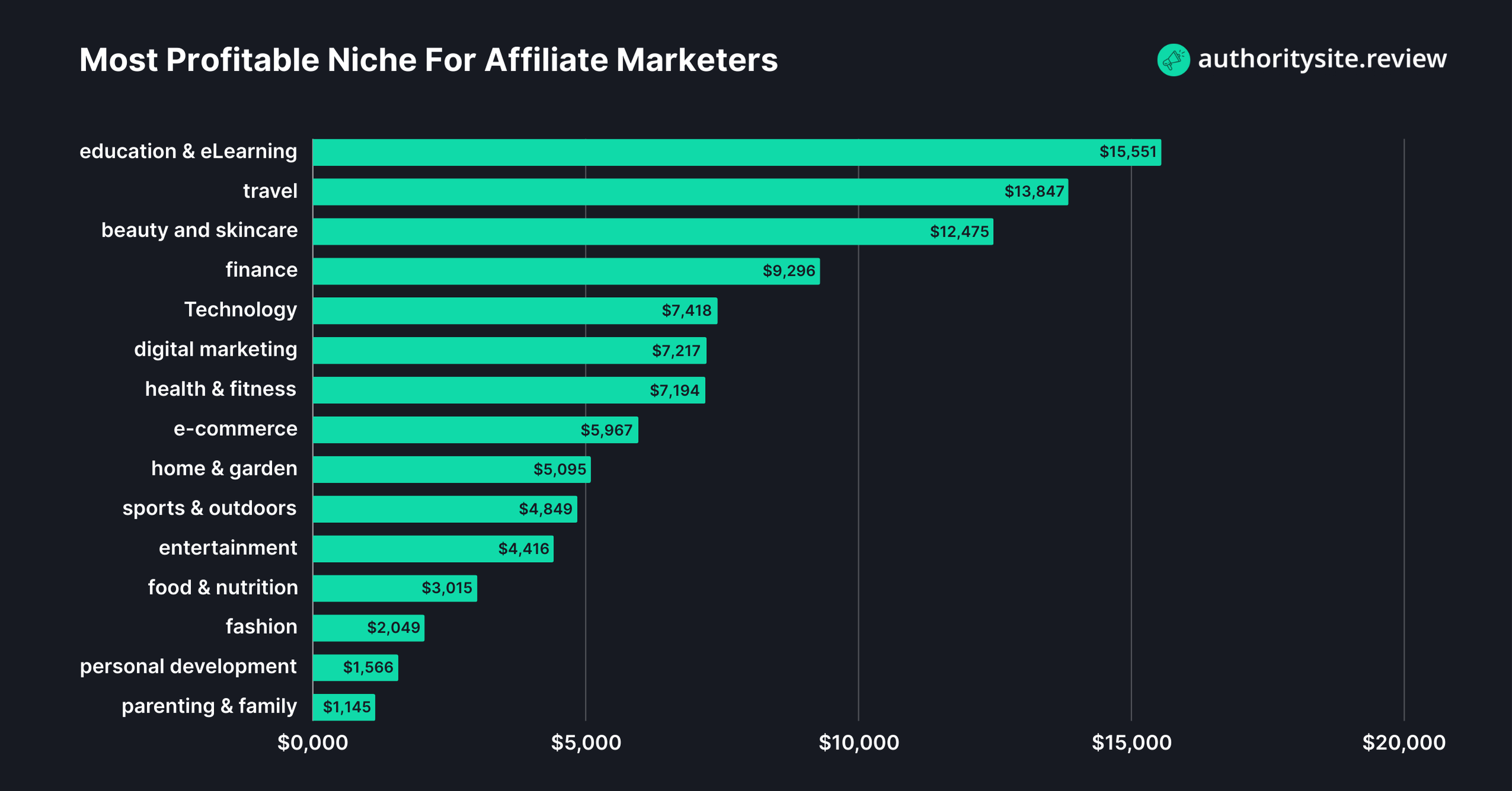
The following table displays the most profitable niches for affiliate marketers.
| Niche | Average Monthly Income Of Affiliate Marketers |
|---|---|
| education and eLearning | $15,551 |
| travel | $13,847 |
| beauty and skincare | $12,475 |
| finance | $9,296 |
| Technology | $7,418 |
| digital marketing | $7,217 |
| health & fitness | $7,194 |
| e-commerce | $5,967 |
| home & garden | $5,095 |
| sports & outdoors | $4,849 |
| entertainment | $4,416 |
| food & nutrition | $3,015 |
| fashion | $2,049 |
| personal development | $1,566 |
| parenting & family | $1,145 |
Source: Authority Hacker
Affiliate Marketing Traffic Sources
SEO is the top traffic source for over 69% of affiliate marketers.
Writing content like blogs yields 65% of the traffic.
67% and 42% of affiliate marketers use social media marketing and email marketing, respectively, as their primary traffic sources.
Marketers who have begun their careers rely 26.7% more on organic social media traffic for affiliate marketing than marketers with over 6 years of experience.
The following table displays the top traffic sources of affiliate marketers.
| Traffic Source | Percentage of Affiliate Marketers |
|---|---|
| SEO | 69% |
| Social media | 67% |
| Content | 65% |
| Email marketing | 42% |
| PPC | 34% |
Source: Luisazhou
Half of the affiliate traffic comes from mobile devices.
Around 80% of affiliate marketers track their desktop and mobile sales, and the majority of sales are recorded from desktop devices, while a large share of traffic is from mobile devices.
Most people check their social media, emails, blogs, etc on the go. Hence, over 50% of the affiliate traffic is from mobile devices.
Source: Luisazhou
Consumers On Affiliate Marketing
74% of internet users in the United States prefer to visit a number of affiliate sites before making a purchase.
The discounts on the products may vary according to the affiliate partners. As a result, some partners may offer more discounts than other partners.
Further, affiliate partners also provide users with detailed reviews of the product, which makes it easy for consumers to understand the product and its offerings.
Hence, most consumers prefer to check out a number of affiliate websites before making a purchase.
Source: Authority Hacker.
81% of consumers have considered purchasing a product or a service after seeing social media posts about it.
8 in 10 consumers said they have researched the products their friends, family, or favorite influencers have posted about.
Besides, 58% of consumers have purchased a product or service promoted by an influencer, and 88% purchased it after being inspired by an influencer marketer.
The majority of these influencers are affiliate partners of the brands they promote. Hence, due to their huge following, they are able to earn a good amount through affiliate marketing.
Source: Business Wire
Over 8 in 10 consumers research about a product online before making an in-store purchase.
Here, affiliate marketers who have a blog with good content and SEO practices are likely to grab the attention of consumers.
As a result, some consumers may end up purchasing from the affiliate links due to the additional discounts available.
Source: Saleslion.
Here are some additional stats on consumer’s approach toward affiliate marketing
- 38% of the consumers trust the affiliate links of influencers more than others.
- 11 of 20 affiliate content is product reviews, and 22% of affiliate content is how-to guides.
- 83% of the customers stated that their shopping decisions change according to the coupon or discount available.
Source: Inmar Intelligence, WeCan Track.
How Much Do Affiliate Marketers Make?
According to Glassdoor, affiliate marketers make an average of $87,605 per year.
The total pay of the affiliate marketers ranges between $66K and $119K per year.
Besides, the average salary of the affiliate marketers is $65,663 per year, while the average additional estimated pay is $21,943 per year.
Source: Glassdoor
57.55% of the affiliate marketers earned below $10k.
According to the survey conducted by the influencer marketing hub, only 3.78% of the affiliate marketers earned over $150k.
Besides, nearly 21% of the affiliate marketers made between $10K and $100K.
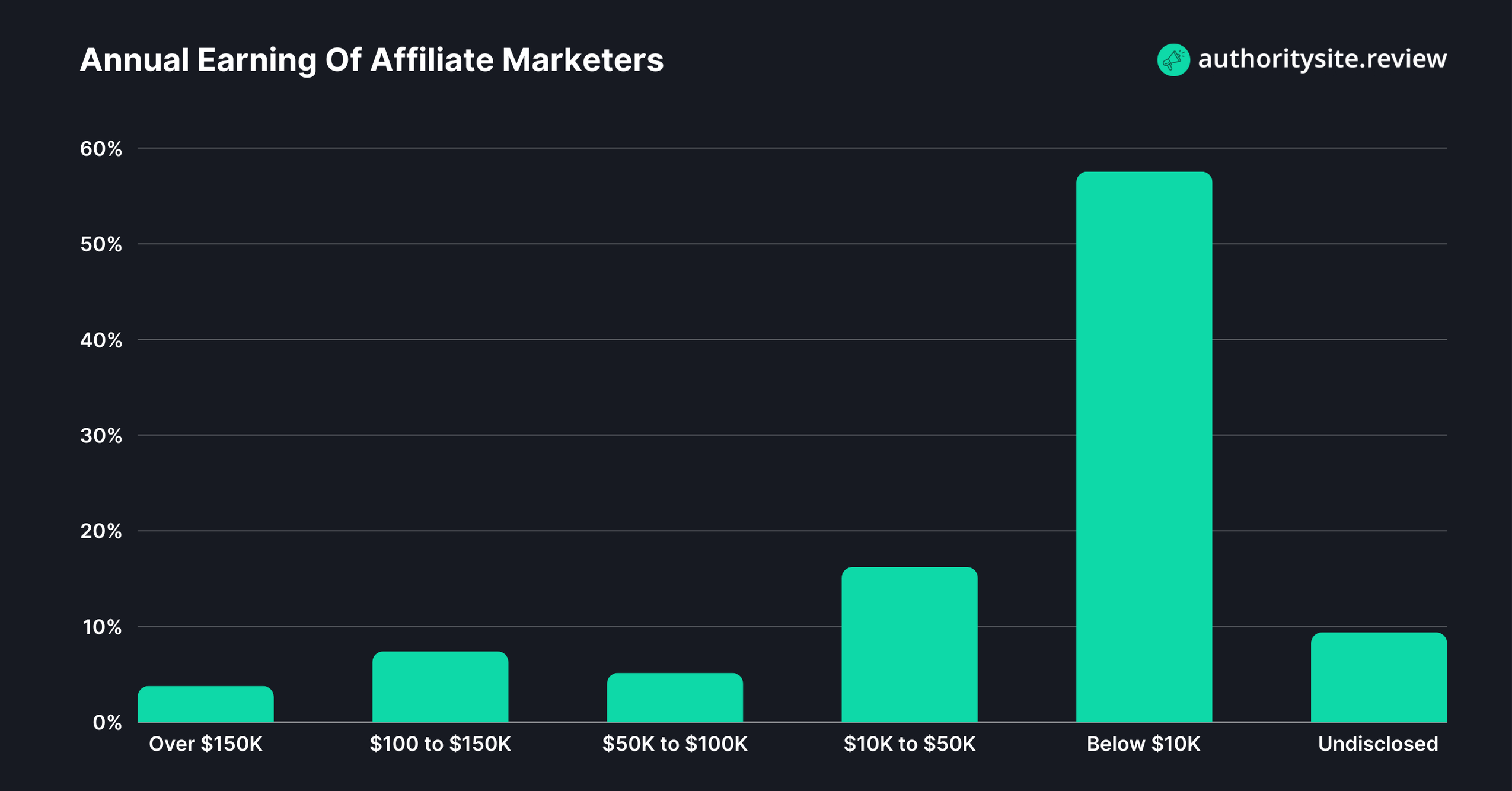
The following table displays the annual revenue of affiliate marketers.
| Annual Revenue of Affiliate Marketers | Percentage of Affiliate Marketers |
|---|---|
| Over $150K | 3.78% |
| $100 to $150K | 7.4% |
| $50K to $100K | 5.15% |
| $10K to $50K | 16.21% |
| Below $10K | 57.55% |
| Undisclosed | 9.37% |
Source: Influencer Marketing Hub
Nearly 3 in 10 creators make $1,000 to $5,000 through affiliate marketing.
At the same time, 31.8% of the creators made below $500 through affiliate marketing, and just 3.7% earned between $5,000 and $10,000 through affiliate marketing.
Further, over 23.4% of the creators earned an average of over $10,000 through affiliate marketing.
The following table displays the amount creators earn through affiliate marketing.
| Earnings of Creators Through Affiliate Marketing | Percentage of Creators |
|---|---|
| $0 to $100 | 8.4% |
| $100 to $500 | 23.4% |
| $500 to $1,000 | 13.1% |
| $1,000 to $5,000 | 28% |
| $5,000 to $10,000 | 3.7% |
| $10,000+ | 23.4% |
Source: Authority Hacker.
Top coupon websites generate over $1 billion in revenue through affiliate marketing.
This is clearly witnessed by Groupon’s increased revenue ( a well-known coupon website). The company generated as much as $3.01 billion in revenue in 2016.
However, with the increased competition in the industry, Groupon’s revenue declined to $514.91 million in 2023.
The following table displays the global revenue Groupon has recorded over the years.
| Year | Groupon’s Global Revenue |
|---|---|
| 2023 | $514.91 million |
| 2022 | $599.09 million |
| 2021 | $967.11 million |
| 2020 | $1,416.87 million |
| 2019 | $2,218.92 million |
| 2018 | $2,636.75 million |
| 2017 | $2,843.88 million |
| 2016 | $3,013.62 million |
| 2015 | $2,954.82 million |
| 2014 | $2,858.65 million |
| 2013 | $2,352.16 million |
| 2012 | $2,334.47 million |
Source: Statista
Benefits Of Affiliate Marketing
28% of the affiliate marketers stated that new innovative marketing partners entering the channel is one of the strengths of affiliate marketing.
At the same time, another 28% of the affiliate marketers stated that affiliate marketing provides incremental value, and 27% of the marketers stated that it is simple to manage.
Here is a table displaying the strength of affiliate marketing as stated by the affiliate marketers.
| Strength of Affiliate Marketing | Percentage of Marketers |
|---|---|
| There are always new, innovative marketing partners entering the channel | 28% |
| It provides clear incremental value | 28% |
| It is simple to manage | 27% |
| It is highly flexible compared to other channels | 26% |
| It is a transparent ad channel that can be clearly tied to sales | 26% |
| It is a reliable source of revenue | 26% |
| Affiliate marketers can control the specific marketing outcomes | 25% |
| The diverse variety of partner types available | 24% |
| It is an industry premised on personal relationships | 24% |
| It delivers a high return on investment (ROI) | 24% |
Source: Statista.
Challenges Of Affiliate Marketing
45% of the affiliate marketers reported that their biggest challenge is getting traffic.
Besides, 25.1% of affiliate marketers stated that algorithm updates are one of the biggest challenges and have negatively affected them.
47.4% of affiliate marketers who were negatively affected by the algorithm update changed their content strategy.
On the other hand, 63% of affiliate marketers are concerned about affiliate marketing fraud.
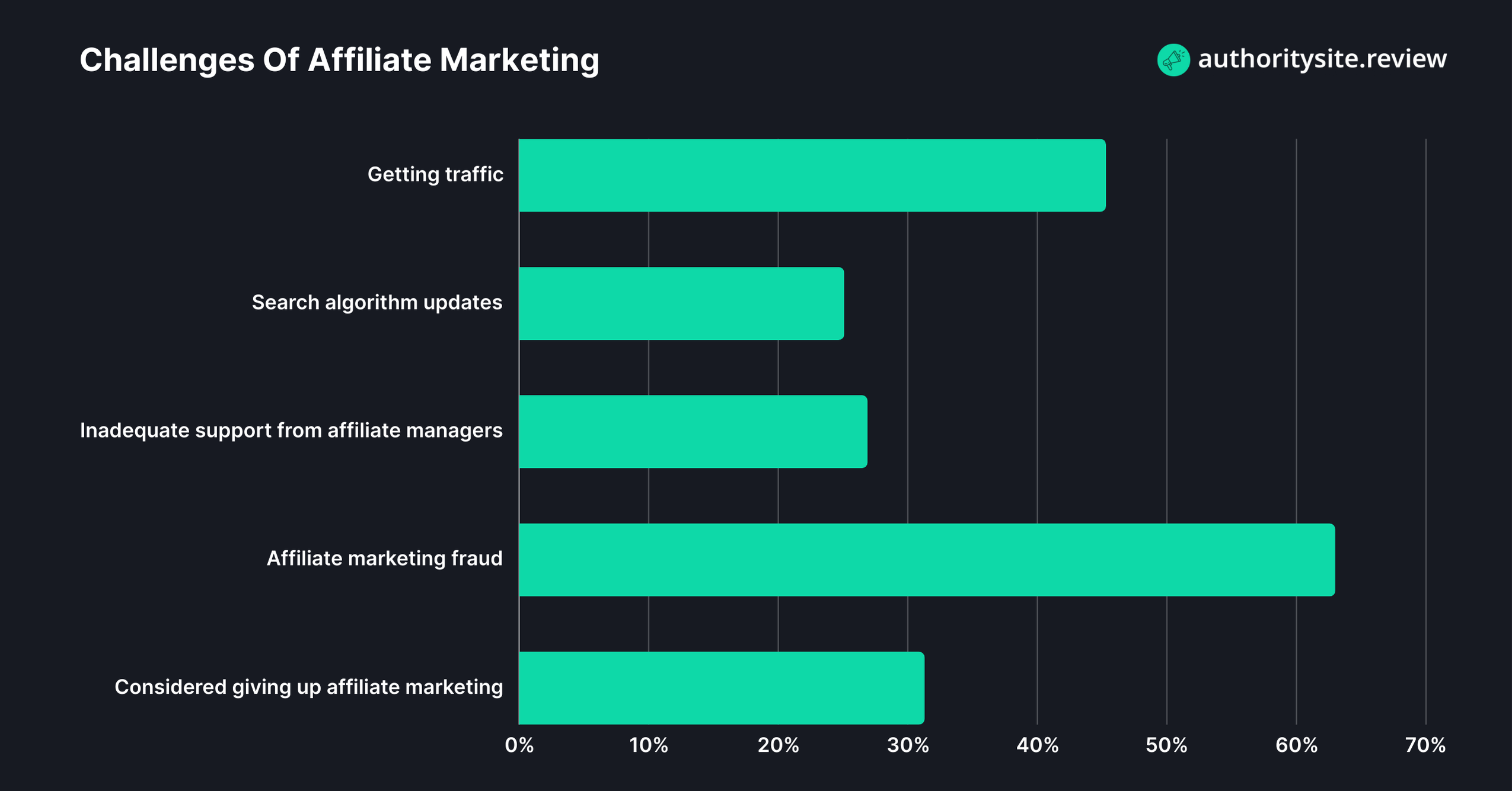
The following table displays the top challenges faced by affiliate marketers.
| Top Challenges | Percentage of Affiliate Marketers |
|---|---|
| Getting traffic | 45.3% |
| Search algorithm updates | 25.1% |
| Inadequate support from affiliate managers | 26.9% |
| Affiliate marketing fraud | 63% |
| Considered giving up affiliate marketing | 31.3% |
Source: Authority hacker
Here are some additional challenges faced by affiliate marketers:
- Nearly 1 in 2 of the affiliate marketers that are negatively affected by the search algorithms stated that they have changed their content strategy.
- According to 40% of media buyers, affiliate marketing fraud is one of the industry’s biggest challenges.
- Inadequate support from affiliate marketers is stated to be one of the biggest challenges of affiliate marketing by 26.9% of affiliate marketers.
- Nearly two-thirds of the affiliate marketers who earn a six-figure income today stated that they had considered giving up on affiliate marketing at least once in their journey.
- Some other challenges that affiliate marketers face are building trust, increasing competition, choosing the wrong niche, not adopting SEO, insufficient research, etc.
Source: Finances Online, Saas Scout, WeCanTrack, AWIN.
General Affiliate Marketing Statistics
Affiliate marketing has an average return of $15 for every $1 invested
That accounts for 1400% returns on the investments made.
Source: AffiliateWP
With 48.09% of the market share, Amazon Associates is the largest affiliate program worldwide.
Other well-known affiliate programs are Rakuten Affiliate Network, which has 7.11% of the market share, and ShareASale, which has a 6.53% share.
The following table displays the most popular affiliate programs worldwide by market share.
| Affiliate Program | Market Share |
|---|---|
| Amazon Associates | 48.09% |
| Rakuten affiliate Network | 7.11% |
| ShareASale | 6.53% |
| CJ Affiliate | 6.42% |
| AWIN | 5.91% |
| Others | 25.94% |
Source: Datanyze
Conclusion: Affiliate Marketing Market Size Is Projected To Reach $7.72 Billion By 2033
The Affiliate market has witnessed an increased adoption over the past few years, and today, over 4 in 5 businesses use it.
Additionally, over 81% of consumers have considered making a purchase after coming across a product suggested by their friends, family, or favorite influencer, displaying the increased effectiveness of affiliate marketing. Its increased adoption has created vast job opportunities, and around 21% of affiliate marketers make between $10K and $100K.
The highest success rate of affiliate marketing efforts is witnessed in the education and e-learning market, where affiliate marketers earn an average of $15,551.
Hence, according to the trends observed over the past years, the affiliate marketing industry is projected to reach $7.72 Billion by 2033.